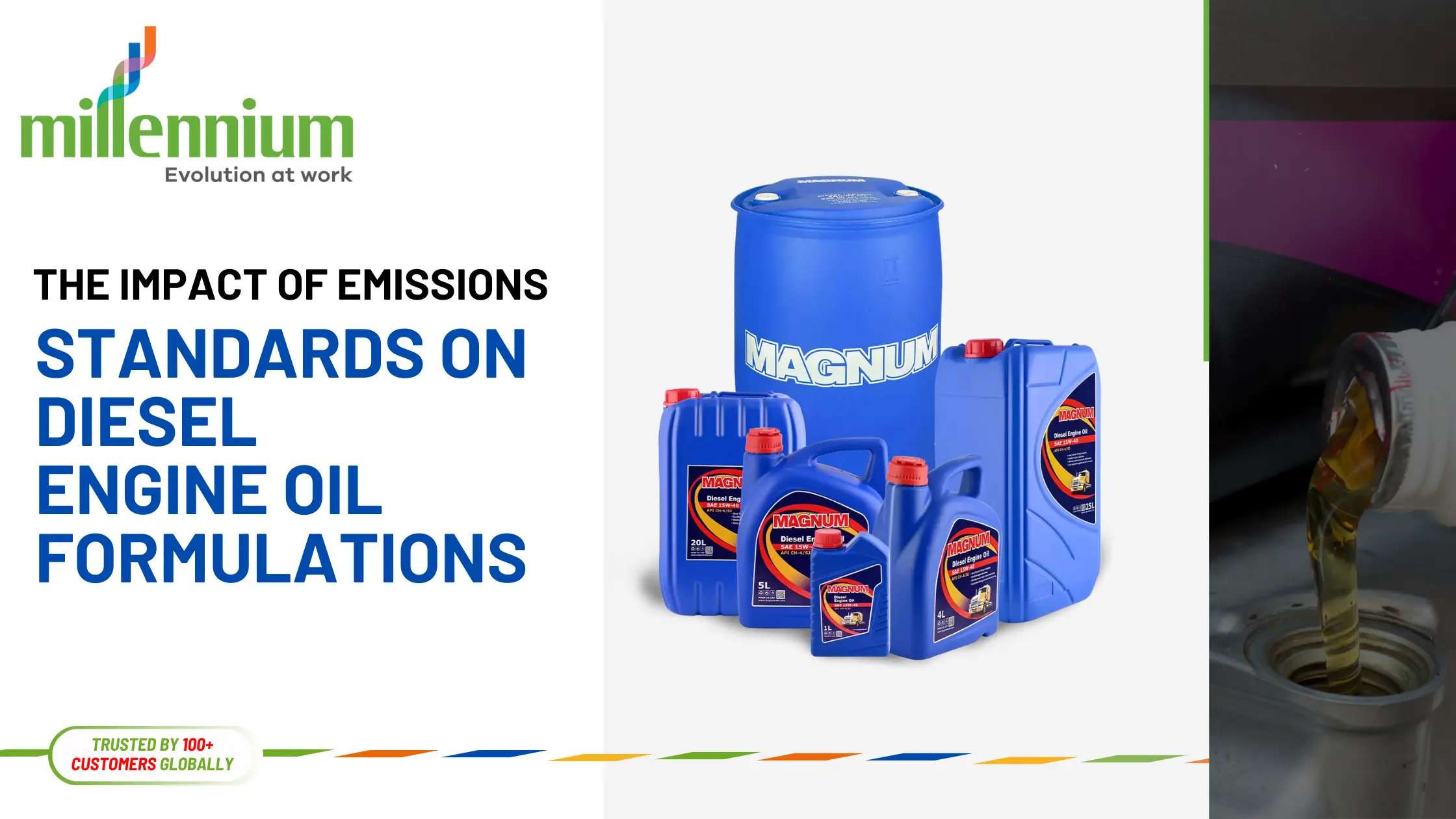There have been a lot of improvements in diesel engines, primarily focused on eliminating the drawbacks of the engine and making it more fuel efficient. This pursuit of cleaner and more efficient diesel engines has been a driving force behind the evolution of emissions standards.
The impact of emissions standards on diesel engine oil formulations is very important and must be considered before choosing an engine oil. As these emissions regulations are quite strict, diesel engines are supposed to offer efficient and cleaner emissions adhering to these standards.
In this guide, we will discuss the impact of engine oil on emissions in detail so that you can pick the right engine oil for your diesel engine. So, make sure you read our guide until the end to understand all the important aspects of engine oils and their impact on emissions standards.
Understanding Diesel Engine Oils
The primary role of diesel engine oil is to reduce friction between moving engine parts, thereby minimizing wear and extending the engine’s lifespan. Additionally, diesel engine oils also help dissipate heat generated during the engine’s operation, preventing overheating which can also damage the engine internally.
Diesel engine oil formulations also significantly impact emissions. These oils play a crucial role in the overall emissions profile of diesel vehicles. The formulation and overall quality of engine oils directly influence the efficiency of engine components, which in turn affects the combustion processes.
The Evolution of Emissions Standards
With the increasing demands and capacity of diesel engines, emission standards have also evolved over the years. Therefore, it is even more important to understand the impact of engine oil on emissions to ensure you are picking up the right engine oil. Emission standards can be traced back to the 1960s when regulatory agencies and governments began to address the growing concern over air pollution caused by automotive exhaust gases.
Over time, emissions standards have evolved significantly, driven by technological advancements. The increasing severity of these standards reflects a global commitment to reducing harmful pollutants and improving air quality. One of the key factors influencing the development of emissions standards is the impact of engine oil on emissions. As regulatory bodies gained a deeper understanding of the role of engine oil in combustion processes, standards were revised to account for these factors.
Engine oils that promote efficient combustion and maintain engine cleanliness contribute significantly to lower emissions of pollutants like NOx, PM, and HC. In recent years, the focus has shifted towards achieving not only compliance but also optimizing engine performance and sustainability.
Impact on Diesel Engine Oil Formulations
Emissions standards have a significant impact on the formulation of diesel engine oils. They help manufacturers select the composition and additives for the oil so that it can adhere to the provided standards without failure. These standards set by governmental bodies simply establish limits on the permissible levels of pollutants emitted by diesel vehicles, driving the need for advanced engine oil formulations.
To meet these emissions requirements, diesel engine oils must be formulated with lower levels of sulfated ash, phosphorus, and sulfur. This is essential for several reasons. Firstly, lower ash content reduces the formation of deposits in the engine, which can adversely affect combustion efficiency.
Also, reducing phosphorus content helps preserve the effectiveness of emission control systems such as diesel particulate filters, which can be sensitive to phosphorus poisoning. Minimizing sulfur content in engine oils also contributes to lower sulfur dioxide emissions during combustion, leading to cleaner exhaust gasses.
Adapting to Changing Standards
Oil manufacturers are actively adjusting their oil compositions to ensure that their products comply with emission standards. Emission standards have had the most significant impact on diesel engine oils, as they not only make the oil safer for the environment but also highly beneficial for the engine.
Furthermore, oil manufacturers also need to invest time in research and development to introduce additives and base oils that enhance engine performance while meeting emissions requirements. These advanced formulations offer improved lubrication, reduced friction, enhanced wear protection, and better compatibility with engines. Such oils contribute to cleaner combustion and prolonged emission control system durability.
Choosing engine oils that meet or exceed the latest standards contributes to a cleaner environment by reducing the release of pollutants into the atmosphere. It also supports the longevity and effectiveness of emission control technologies, ensuring they operate efficiently over time.
Frequently Asked Questions
How do emissions standards affect diesel engine oil formulations?
What are the key components of diesel engine oil that impact emissions?
Do emissions standards vary by region or country?
Can using the wrong diesel engine oil affect emissions test results?
How can I ensure that the diesel engine oil I use meets the latest emissions standards?
Conclusion
Emissions standards continue to push for cleaner exhaust gasses globally. Engine oils now must adhere to stricter limits on pollutants like sulfur, ash, and phosphorus to meet these standards. Manufacturers are actively adjusting oil compositions and investing in research to develop oils that optimize engine performance while reducing emissions. So, using the right diesel engine oil is critical for maintaining engine health as well as ensuring that your engine meets the requirements set by emission standards. For that, you should always look for oils that comply with industry specifications like ACEA or API to ensure they meet the latest emissions standards.



